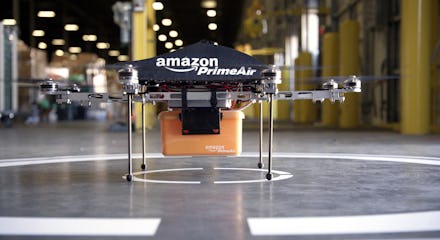FAA: Delivery Drones Won't Be Happening Anytime Soon

Pizza delivery men won't be replaced by robots anytime soon.
After a decade of review, the Federal Aviation Authority released on Monday its proposed rules on operating small commercial drones. The draft calls for pilots to pass a knowledge test and obtain a certificate that costs $200. It prohibits drones from flying around bystanders and caps their speed at 100 mph and an altitude of 500 feet.
Government officials also clamped down on ambitious ideas floated by Amazon and Google that would use the drones as delivery vehicles. The proposal also includes a clause that drones must be operated within eyesight of the pilot and not after dark. Unfortunately for those companies, that means no late-night pizza-delivery drones.
No pizza? Then what can people do with drones? Authorities envision a world where the unmanned aerial vehicles take photographs and provide video inspections of tall structures (like cell phone towers and bridges). Real estate companies and police departments would be able to zip them around for work purposes, the Washington Post notes.
Currently, drone pilots operate under hazy rules that only prevent them from flying beyond 400 feet in the air and disturbing the peace. These new regulations finally address more specific problems, like drones flying too close to airports. "We have tried to be flexible in writing these rules," said FAA Administrator Michael Huerta, according to NBC News. "We want to maintain today's outstanding level of aviation safety without placing an undue regulatory burden on an emerging industry."
Reuters reports that the draft rules will have to endure public comment and revision before they become final, which could take another year or so. If the rules make it through revision, that means Amazon's plans will be revealed as what they truly were: a big publicity stunt that had no chance of making it in the real world. But Amazon will still be calling on regulators to change them.
"The FAA needs to begin and expeditiously complete the formal process to address the needs of our business and, ultimately, our customers,'' Paul Misener, the company's vice president for global policy, told USA Today. "We are committed to realizing our vision for Prime Air and are prepared to deploy where we have the regulatory support we need."